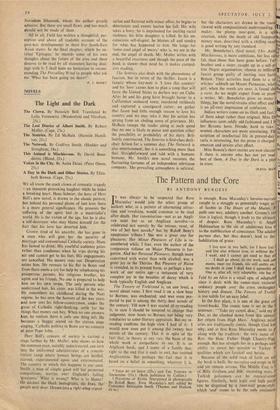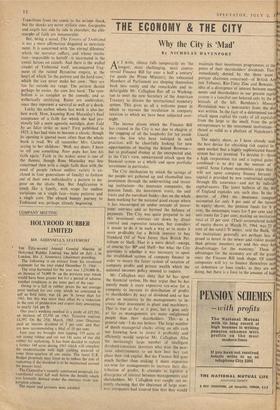The Pattern and the Core •
BY ANTHONY BURGESS
IT was always to be suspected that Rose 'Macaulay would join the select group of authors who, in a pattern of alternating attrac- tion and revulsion, would continue to be read after death. Her canonisation—not as an Angli- can saint but as an Anglican novelist—is celebrated not merely by the reissue, reset, of two of her best novels,* but by Roloff Beny's sumptuous tribute.[ She was a great one for pleasures. Her Minor Pleasures of Life is re- membered while, I fear, even the author of the companion volume on Major Pleasures is for- gotten. And her Personal Pleasures, though more concerned with water than with alcohol, was a great joy in ihe Thirties. But Pleasure of Ruins is revealed, in its present form, as perhaps a key- , work of our entire age—a testament of very complex joy in the beauties of decay which is both typically English and Anglican.
The Towers of Trebizond is, on one level, a novel about ruins. I first read it on a slow boat to Borneo, was enchanted, and was even pre- pared to put it among the thirty• best novels of the century. Till now I was scared of-re-reading it, in case I. should be tempted to change that judgment, slow boats to Borneo not ‘being very conducive to sober literary appraisals. But my re- reading confirms the high view I had of it: I would now even put it among the twenty best novels of the century. This is in spite of the fact that, in theory at any rate, the basis of the whole work is antipathetic to me. It is an Anglican book, and I come of a family that, right to the end (for it ends in me), has resisted Anglicanism. But perhaps the fact that it is based on a belief in something, whatever it is,
* TOLD BY AN IDIOT (25s.) and Tim TOWERS OF TuErtizoNo (21s.). (Both published by Collins)
t PLEASURE or RUINS. Interpreted in photographs .by. Roloff Bony; Rose Macaulay's- text edited by Constance Babington Smith. (Thames and Hudson. £6 6s.) is enough. Rose Macaulay's heroine-narrat caught in a struggle as potentially tragic as of Scobie in The Heart of the Matter. F pulls one way, adultery another. Greene's re tion is logical, though it leads to the ultimate of despair. Rose Macaulay's is Angl': Habituation to the sin of adulterous love 1 to the stultification of conscience. The adulte partner dies, but that doesn't lead to the habilitation of grace: I live now in two hells, for I have lost and live also without love, or without the 1 want, and I cannot get used to that ei . . . I shall go about, do my work, seek ments, meet my friends, life will amble on, no doubt in time I shall find it agreeable a One is, after all, very adaptable; one has to,
Told by an Idiot is a small epic of adaptabi since it deals with the comic-stoic victories
ordinary people over' the crass, onslaughts'
history and disease. The Towers of TrebiZ is too subtle for an easy label.
In the first place, it is one of the great co travel-books. The comic tone is set in the 'sentence: "Take my camel, dear," said my Dot, as she climbed down from this animal her return from High ,Mass.' Anglican missl 'aries are traditionally comic, though God kit why, and at first Rose Macaulay seems to along with the tradition: the very name of Rev. the Hon. Father Hugh Chantry-Pig'; enough. But her strength lies in a perhaps uni ability to invest her mission to Turkey qualities which are farcical and heroic. Because of the solid rock of faith on wh, the book is built, the narrative can erupt in fa. and yet remain serious. The Middle East is f of Billy Graham. and BBC recording vans, Turkish policemen can be musical-co figures. Similarly, both logic and high purp can be disguised by a faux-nail prose-style which 'and' seems to be the only conjuncts'
Transitions from the comic to the serious shock, but the shocks are never stylistic ones. Gargoyles and angels leer side by side in churches; the allo- morphs of faith are innumerable.
But, being a novel, The Towers of Trebizond is not a mere affi
rmation disguised as entertain- ment. It is concerned with 'the eternal dilemma' which the narrator suffers, and whose resolu- tion—impossible to herself—is incarnated in the comic heroes on camels. And there is the walled citadel of Trebizond itself, unconquered frag- ment of the ruined Byzantine empire, at the heart of which lie the pattern and the hard core,' which she can never make her own: 'they are too far outside my range. The pattern should perhaps be easier, the core less hard.' The sym- bolism is as complex as the comedy, and as esthetically satisfying. Ruins are ambivalent, since they represent a survival as well as a death.
Lucky the author whose last work is also -her best work. How, knowing Rose Macaulay's final acceptance of a faith for which she had pre- viously felt a mere agnostic nostalgia, does Told by an Idiot strike us now? First published in 1923, it has had time to become a classic, though its opening is quoted more often than the whole book is read. We all remember Mrs. Garden saying to her children: 'Well, my dears, I have to tell you something. Poor papa has lost his faith again.' Faith in the widest sense is one of the themes, though Rose Macaulay was less concerned then with a single faith than with,the need of people (whose endless variety is en- closed in four generations of family) to fashion out of their own individuality a pattern to im- pose on the idiotic flux. But Anglicanism is much like a family, with scope for endless variations on a single face—many patterns and a single core. The absurd bumpy journey to Trebizond was perhaps already beginning.











































 Previous page
Previous page